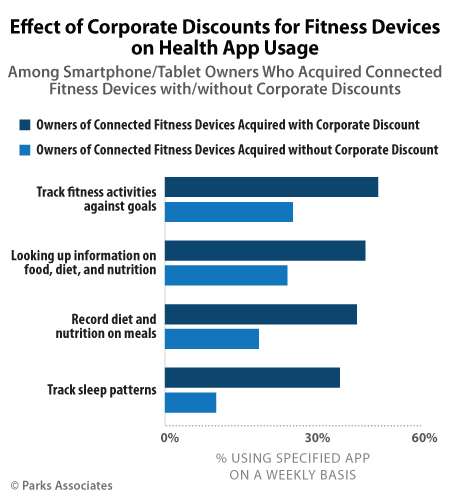Opportunities for Wearables Device OEMs: Employers’ Wellness Programs
The emerging wearables market, especially with the entrance of Google and Apple, can have a huge impact on employer-offered corporate wellness programs. If wearable device makers can customize their solutions to meet employer’s needs and overcome challenges such as employee privacy and data security concerns, the corporate wellness programs can become a significant distribution channel for their products.
Employers, which comprise the largest buyer group of health insurance on behalf of their employees, have always been interested in sponsoring health and wellness management programs as an employee benefit. Parks Associates estimates that there are already 15 million consumers enrolled in a corporate wellness program, ranging from popular weight loss programs to low-key alcohol management courses. Discounted gym memberships or subsidized weight loss programs are common in a corporate wellness program, In exchange, employees are encouraged to log their participation and report their progress and feedback to corporate benefit administrators. Although wearable device OEMs claim that their devices can help consumers better manage health and wellness, corporate wellness program providers are actively conducting research to verify these claims. If usage can be linked to improved productivity, reduced work absence, lowered health bills, and cutbacks on health insurance premium payments, then employers will find it justified to offer wearable devices to their employees with discounts or even a full subsidy.

Parks Associates’ consumer data point to some evidence of such links. Owners of a fitness or wellness device acquired through a corporate wellness program actually use the device much more frequently than owners who do not benefit from a corporate discount. More needs to be done and wearable device OEMs are on top of it. Fitbit, the market leading wearable brand, is actively exploring the corporate wellness market opportunities for its devices through its newly acquired FitStar wellness service division. It is conducting trials to validate FitBit’s benefits used in conjunction with a wellness program. The company recently convinced U.S. retailer Target to offer a free Fitbit Zip to all its 330,000+ employees, a significant win for the company.
Longer-term, corporate wellness program success could prompt public and private insurers to offer similar approaches to help consumers manage their health and wellness.
Further Reading:
- Key Developments in the Connected Health Markets
- 33% of U.S. Broadband Households Own At Least One Connected Health Device, up from 24% in 2013
- Analyst View: Apple and Google’s Impact on the Healthcare Industry
Next: Connected Health Device Adoption on the Rise in U.S.
Previous: Five Developments to Reshape the Connected Health Market
Comments
-
Be the first to leave a comment.
Post a Comment
Have a comment? Login or create an account to start a discussion.


